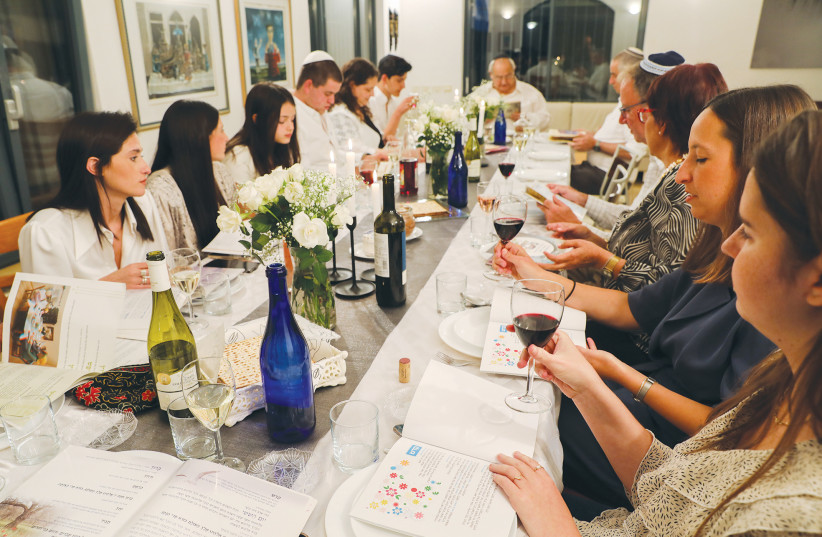A Passover Seder is possible. But for many other moments, probably not. For how can we commemorate the incomprehensible, the totally unimaginable?
How can we have a Seder to commemorate a time when all was out of order, when there was no law, no order, except for those for whom alles ist in Ordnung!? What could we do?
Would we sit in complete darkness? Would there be just one dim candle far across the room? Or would there be many candles around the room that we quickly collect and then slowly snuff out, one by one?
Would there even be a table around which we can only stand, for we are forbidden to sit, and surely never to recline?
If there would be a table, would there be an appropriately empty bowl? Perhaps there should be four cups – of salt water? – to commemorate our blood and sweat, and, perhaps, our and God’s tears?

Would there be a bowl full of disorder: pieces of broken bone that cannot be put back together; small pieces of rotting potato flavored with grass; bloodred horseradish; egg shells sharp as broken glass?
Do we wash our hands after being touched by this mess – and pray that it is water that comes out of the faucet?
What kind of Haggadah could there be? Should we not sit in utter silence? If we do speak, is it only in broken whispers – and only after looking around us to see if anyone can hear our words? Or do we just listen to the screams in our heads? Or do we scream out – perhaps, again, not to be heard, or perhaps never to be heard of again?
What questions do we ask? What questions can we ask? Why? How? Of whom? Where were the humane beings at those moments? What is the matter with the human race? Who can we trust? What can we do to avoid the inevitable next time?
Do we bar the doors, so no one alive – or all those ghosts – can enter?
IF THERE is one imperative in this non-Seder Haggadah, it is that “it is incumbent on each of us to imagine that we, too, experienced the Shoah!” But can we?
I have tried, but failed. What were the last thoughts of my father’s uncle, after whom I was named, as he ran out of the bunker he was hiding in to save a child, only to be seen by local partisans, who killed him and the others in the bunker.
Or a third or so cousin, as he was literally being chopped to pieces when he was finally caught after a number of heroic successes saving fellow Jews by wearing a stolen German officer’s uniform?
I would not want to even try to imagine my mother-in-law’s experiences after hearing her screams during her regular nightmares that took her back to those times, nightmares that stopped for a while after her first grandchild was born.
I cannot – and do not want to – imagine the anguish of relatives, friends, teachers and colleagues who have lost children, siblings, parents and others murdered by terrorists, or lost defending the people and Land of Israel. Unending pain.
Nor do I want to even consider the increasing fear of innocents as they get on a subway, go to a mall or movie theater, or who jump as a motorcycle roars past. Or as they go to pray in their shul.
But I cannot stop from thinking: What was in my father-in-law’s head during that last death march? He was one of only eight survivors from the 200 Jewish men in a forced labor battalion in the Hungarian Army – allies of the Germans. He had already lost a wife and child. Did he think he would survive at all?
Could he imagine being married again, having children again, let alone grandchildren, or that his great-grandchildren would serve in the army and navy of a Jewish state called Israel? But I can begin to understand his great joy at the birth of each, and his smile when he saw each – even to his last years.
SO, IN and from this season, I have learned a lesson. We may ask: Is this “un-Seder imperative” possible? How can we know if we have accomplished it? Do we have to have nightmares that night? Do we rush instinctively to pack an escape bag? What do we pack in it? And where can we go? Can we commemorate the incomprehensible past, and change the increasingly unimaginable present?
Not completely. But we can find an answer. We can build upon what we are able to understand to help create a better future for ourselves and for others.
And from all this we can draw at least one conclusion. We should conclude the never-ending disordered Seder by saying: This – and every year – in Jerusalem!
The writer is a new oleh. He is an educator, lecturer and a Jewish communal professional. For over 50 years, he served in leadership positions in day schools, Jewish federations, and boards of Jewish education.
